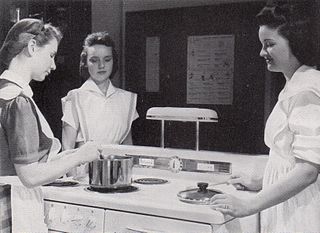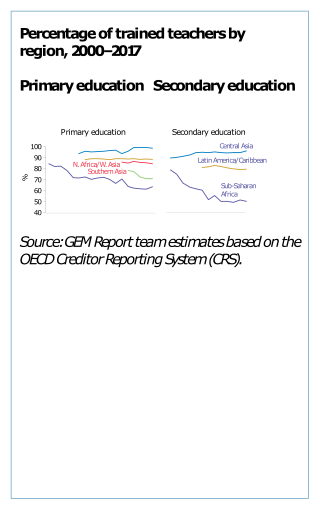Related Research Articles
A teaching method is a set of principles and methods used by teachers to enable student learning. These strategies are determined partly on subject matter to be taught and partly by the nature of the learner. For a particular teaching method to be appropriate and efficient it has take into account the learner, the nature of the subject matter, and the type of learning it is supposed to bring about.
Transformative learning, as a theory, says that the process of "perspective transformation" has three dimensions: psychological, convictional, and behavioral.
Transformative learning is the expansion of consciousness through the transformation of basic worldview and specific capacities of the self; transformative learning is facilitated through consciously directed processes such as appreciatively accessing and receiving the symbolic contents of the unconscious and critically analyzing underlying premises.

Experiential education is a philosophy of education that describes the process that occurs between a teacher and student that infuses direct experience with the learning environment and content. The term is not interchangeable with experiential learning; however experiential learning is a sub-field and operates under the methodologies of experiential education. The Association for Experiential Education regards experiential education as "a philosophy that informs many methodologies in which educators purposefully engage with learners in direct experience and focused reflection in order to increase knowledge, develop skills, clarify values, and develop people's capacity to contribute to their communities". Experiential education is the term for the philosophy and educational progressivism is the movement which it informed. The Journal of Experiential Education publishes peer-reviewed empirical and theoretical academic research within the field.

Experiential learning (ExL) is the process of learning through experience, and is more narrowly defined as "learning through reflection on doing". Hands-on learning can be a form of experiential learning, but does not necessarily involve students reflecting on their product. Experiential learning is distinct from rote or didactic learning, in which the learner plays a comparatively passive role. It is related to, but not synonymous with, other forms of active learning such as action learning, adventure learning, free-choice learning, cooperative learning, service-learning, and situated learning.

Constructivism is a theory in education which posits that individuals or learners do not acquire knowledge and understanding by passively perceiving it within a direct process of knowledge transmission, rather they construct new understandings and knowledge through experience and social discourse, integrating new information with what they already know. For children, this includes knowledge gained prior to entering school. It is associated with various philosophical positions, particularly in epistemology as well as ontology, politics, and ethics. The origin of the theory is also linked to Swiss developmental psychologist Jean Piaget's theory of cognitive development.
Cognitive apprenticeship is a theory that emphasizes the importance of the process in which a master of a skill teaches that skill to an apprentice.
Reflective practice is the ability to reflect on one's actions so as to take a critical stance or attitude towards one's own practice and that of one's peers, engaging in a process of continuous adaptation and learning. According to one definition it involves "paying critical attention to the practical values and theories which inform everyday actions, by examining practice reflectively and reflexively. This leads to developmental insight". A key rationale for reflective practice is that experience alone does not necessarily lead to learning; deliberate reflection on experience is essential.
Micro-teaching is a teacher training and faculty development technique whereby the teacher reviews a recording of a teaching session, in order to get constructive feedback from peers and/or students about what has worked and what improvements can be made to their teaching technique. Micro-teaching was invented in 1963 at Stanford University by Dwight W. Allen, and has subsequently been used to develop educators in all forms of education.
Mastery learning is an instructional strategy and educational philosophy, first formally proposed by Benjamin Bloom in 1968. Mastery learning maintains that students must achieve a level of mastery in prerequisite knowledge before moving forward to learn subsequent information. If a student does not achieve mastery on the test, they are given additional support in learning and reviewing the information and then tested again. This cycle continues until the learner accomplishes mastery, and they may then move on to the next stage. In a self-paced online learning environment, students study the material and take assessments. If they make mistakes, the system provides insightful explanations and directs them to revisit the relevant sections. They then answer different questions on the same material, and this cycle repeats until they reach the established mastery threshold. Only then can they move on to subsequent learning modules, assessments, or certifications.

Teacher education or teacher training refers to programs, policies, procedures, and provision designed to equip (prospective) teachers with the knowledge, attitudes, behaviors, approaches, methodologies and skills they require to perform their tasks effectively in the classroom, school, and wider community. The professionals who engage in training the prospective teachers are called teacher educators.
English-language Learner is a term used in some English-speaking countries such as the United States and Canada to describe a person who is learning the English language and has a native language that is not English. Some educational advocates, especially in the United States, classify these students as non-native English speakers or emergent bilinguals. Various other terms are also used to refer to students who are not proficient in English, such as English as a second language (ESL), English as an additional language (EAL), limited English proficient (LEP), culturally and linguistically diverse (CLD), non-native English speaker, bilingual students, heritage language, emergent bilingual, and language-minority students. The legal term that is used in federal legislation is 'limited English proficient'. The instruction and assessment of students, their cultural background, and the attitudes of classroom teachers towards ELLs have all been found to be factors in the achievement of these students. Several methods have been suggested to effectively teach ELLs, including integrating their home cultures into the classroom, involving them in language-appropriate content-area instruction early on, and integrating literature into their learning programs.

Tracking is separating students by academic ability into groups for all subjects or certain classes and curriculum within a school. It may be referred to as streaming or phasing in some schools.

Reflective writing is an analytical practice in which the writer describes a real or imaginary scene, event, interaction, passing thought, or memory and adds a personal reflection on its meaning. Many reflective writers keep in mind questions such as "What did I notice?", "How has this changed me?" or "What might I have done differently?" when reflecting.
Teacher quality assessment commonly includes reviews of qualifications, tests of teacher knowledge, observations of practice, and measurements of student learning gains. Assessments of teacher quality are currently used for policymaking, employment and tenure decisions, teacher evaluations, merit pay awards, and as data to inform the professional growth of teachers.

A flipped classroom is an instructional strategy and a type of blended learning, which aims to increase student engagement and learning by having pupils complete readings at home and work on live problem-solving during class time. This pedagogical style moves activities, including those that may have traditionally been considered homework, into the classroom. With a flipped classroom, students watch online lectures, collaborate in online discussions, or carry out research at home, while actively engaging concepts in the classroom, with a mentor's guidance.
Miriam G. Sherin is a professor in the School of Education and Social Policy and the Learning Sciences Department at Northwestern University. Her areas of research include mathematics teaching and learning, teacher cognition, and teacher education. Sherin has published articles in Journal of Teacher Education, Teaching and Teacher Education, and Journal of Mathematics Teacher Education. Her most recent book, Mathematics Teacher Noticing: Seeing Through Teachers' Eyes, was publish in 2011 by Taylor & Francis. Since 2018 she has been associate provost for undergraduate education at Northwestern University. She is the sister of sociology scholar Adam Gamoran, currently president of the William T. Grant Foundation.
In education, authentic learning is an instructional approach that allows students to explore, discuss, and meaningfully construct concepts and relationships in contexts that involve real-world problems and projects that are relevant to the learner. It refers to a "wide variety of educational and instructional techniques focused on connecting what students are taught in school to real-world issues, problems, and applications. The basic idea is that students are more likely to be interested in what they are learning, more motivated to learn new concepts and skills, and better prepared to succeed in college, careers, and adulthood if what they are learning mirrors real-life contexts, equips them with practical and useful skills, and addresses topics that are relevant and applicable to their lives outside of school."
Facing History and Ourselves is a global non-profit organization founded in 1976. The organization's mission is to "use lessons of history to challenge teachers and their students to stand up to bigotry and hate." The organization is based in Boston, Massachusetts, with 180 staff members in the main office and in other U.S. states.
Data-driven instruction is an educational approach that relies on information to inform teaching and learning. The idea refers to a method teachers use to improve instruction by looking at the information they have about their students. It takes place within the classroom, compared to data-driven decision making. Data-driven instruction works on two levels. One, it provides teachers the ability to be more responsive to students’ needs, and two, it allows students to be in charge of their own learning. Data-driven instruction can be understood through examination of its history, how it is used in the classroom, its attributes, and examples from teachers using this process.
Deidre Marjorie Le Fevre is a New Zealand academic, and is a full professor at the University of Auckland, specialising in educational leadership, teacher training and education improvement.
References
- ↑ Rosaen, Cheryl L.; Lundeberg, Mary; Cooper, Marjorie; Fritzen, Anny; Terpstra, Majorie (2008). "Noticing Noticing: How Does Investigation of Video Records Change How Teachers Reflect on Their Experiences". Journal of Teacher Education. 59 (4): 347–360. doi:10.1177/0022487108322128.
- ↑ Rosaen, Cheryl L.; Lundeberg, Mary; Cooper, Marjorie; Fritzen, Anny; Terpstra, Majorie (2008). "Noticing Noticing: How Does Investigation of Video Records Change How Teachers Reflect on Their Experiences". Journal of Teacher Education. 59 (4): 347–360. doi:10.1177/0022487108322128.
- ↑ Calandra, Brendan; Brantley-Dias, Laurie; Lee, John K.; Fox, Dana L. (2009). "Using video editing to cultivate novice teachers' practice". Journal of Research on Technology in Education. 42 (1): 73–94. doi:10.1080/15391523.2009.10782542.
- ↑ Levin, David M.; Hammer, David; Coffey, Janet E. (March–April 2009). "Novice Teachers' Attention to Student Thinking". Journal of Teacher Education. 60 (2): 142–154. doi:10.1177/0022487108330245.
- ↑ Linsenmeier, Katherine A.; Sherin (2009). "Miriam Gamoran". Teaching Children Mathematics. 15 (7): 418–422.
- ↑ Sherin, Miriam Gamoran (2000). "Viewing teaching on videotape". Educational Leadership. 57 (8): 36–38.
- ↑ van Es, Elizabeth (2010). "Viewer Discussion Is Advised: Video Clubs Focus Teacher Discussion on Student Learning". Journal of Staff Development. 31 (1): 54–58.